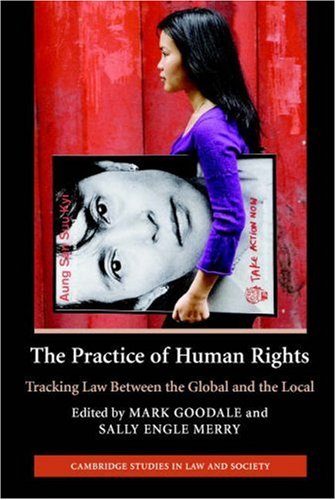Mark Goodale, Sally Engle Merry0521865174, 9780521865173, 9780511335341, 9780521683784, 0521683785
Table of contents :
Cover……Page 1
Half-title……Page 3
Title……Page 5
Copyright……Page 6
Contents……Page 7
Contributors……Page 9
Acknowledgments……Page 13
Introduction Locating rights, envisioning law between the global and the local……Page 15
The different meanings of human rights……Page 19
Human rights between the global and the local……Page 24
Global/local and other binaries……Page 27
From structures of power to utopia – the emergence of human rights networks……Page 31
Betweenness and the human rights imaginary……Page 36
The practice of human rights……Page 38
States of violence……Page 41
Registers of power……Page 43
Conditions of vulnerability……Page 44
Encountering ambivalence……Page 46
References……Page 49
Part One States of violence……Page 53
Introduction: States of violence……Page 55
References……Page 62
1 Human rights as culprit, human rights as victim: rights and security in the state of exception……Page 63
Rights, security, and the state of exception……Page 67
‘‘Security Talk’’: Security as transnational discourse and Practice……Page 70
Defending security in Cochabamba: violence and rights……Page 76
Conclusion……Page 86
References……Page 88
2 ‘‘Secularism is a human right!’’: double-binds of Buddhism, democracy, and identity in Nepal……Page 92
Transnational neoliberalism and Nepali democracy……Page 95
Nation and religion in a modern Hindu kingdom……Page 98
Contesting the Constitution……Page 102
The legal logic of political secularism: democracy, equality, and human rights……Page 107
Human rights and the identity machine……Page 110
Selves, not-selves and secular double-binds……Page 115
Conclusion: the double-binds of secular Buddhist subjecthood……Page 119
References……Page 123
Legal document……Page 127
Part Two Registers of power……Page 129
Introduction: registers of power……Page 131
References……Page 142
Introduction……Page 144
Empires of law……Page 149
Connotative and denotative power……Page 160
Social resistance within empires of law……Page 165
Human rights and the Pandora’s box of (neo-)liberalism……Page 170
Conclusion – human rights and normative pluralism……Page 172
References……Page 174
Introduction……Page 177
‘‘Los Caminos de la Resistencia’’: from armed uprising to autonomous civilian governance, 1994–2004……Page 180
From modern liberalism to neoliberalism in Mexican law……Page 184
Neoliberal logics of rule……Page 188
The trouble with rights……Page 190
Dissing the state……Page 195
Alternative logics: reconceptualizing rights……Page 197
Alternative logics: reordering rule……Page 198
Conclusions: reconfiguring resistance……Page 201
References……Page 202
Part Three Conditions of vulnerability……Page 207
Introduction: conditions of vulnerability……Page 209
References……Page 217
Introduction……Page 218
Background……Page 219
Perspectives and aims of essay……Page 223
The cases……Page 225
The case of Francisco Gembuel……Page 229
The case of Jesús Piñacué……Page 235
The case of contested indigenous status in Putumayo……Page 240
Conclusions……Page 245
References……Page 249
Legal case……Page 255
6 The 2000 UN Human Trafficking Protocol: rights, enforcement, vulnerabilities……Page 256
Examining the Trafficking Protocol as a legal text reflecting its genesis……Page 259
Drafting the text in Vienna……Page 266
The living history of the anti-Trafficking Protocol……Page 271
Conclusions……Page 277
References……Page 280
Part Four Encountering ambivalence……Page 285
Introduction: encountering ambivalence……Page 287
References……Page 297
Introduction……Page 299
From nation-centered to transnational movement……Page 303
Creating a transnational legal space……Page 307
Using the Alien Tort Claims Act to sue corporations……Page 310
The Law of Nations……Page 311
The human rights regime and corporate personhood……Page 314
Discursive ambivalence……Page 316
The discursive ambivalence created by corporations……Page 317
The discursive ambivalence created by states……Page 319
Conclusion……Page 325
References……Page 330
Statutes and treaties……Page 333
8 Being Swazi, being human: custom, constitutionalism and human rights in an African polity*……Page 334
Scales of justice and justice without scales……Page 335
Looking for Swazi citizens and Swazi subjects: the theoretical inversions suggested by Swazi divine kingship……Page 339
Ambivalence and its relation to the scales of justice……Page 348
References……Page 354
Legal document……Page 355
Introduction……Page 356
From legal pluralism to social process……Page 359
Four processes of law and rights……Page 364
The legalization of rights, or politics by other means……Page 365
Human rights and the verticalization of conflict……Page 369
The vernacularization of human rights and legal discourse……Page 371
Law’s epistemology: the construction of knowledge and power……Page 374
Conclusions……Page 379
References……Page 380
Index……Page 384

Reviews
There are no reviews yet.